Manage different cases with one central solution
Cancer patients require constant vigilance. IntelliSpace Portal provides tools to help you evaluate the stage and treatment response at multiple time points – and efficiently perform essential follow‑ups.
Advanced 3D and graphical tools help you store, present, and communicate clinical information to support diagnostic confidence and productive collaboration.
- Acute Multi-Functional Reivew (AMFR)
-
CT Acute MultiFunctional Review (AMFR)
One application for the assessment of selected anatomies
CT Acute MultiFunctional Review (AMFR) provides dedicated tools for findings detection, visualization and assessment of vessels, bones and spine anatomies in 2D and 3D CT images.
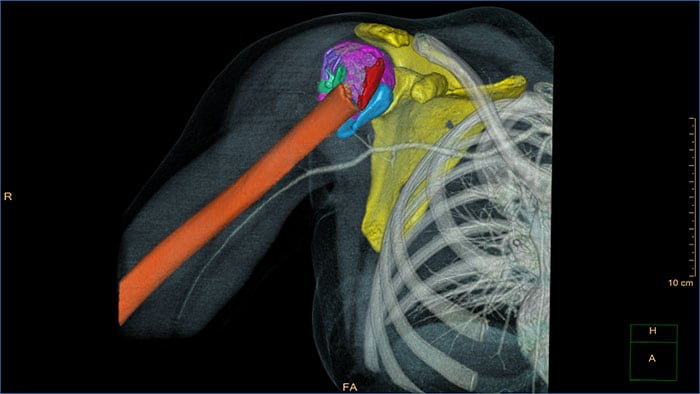
Benefits
- Automatic navigation-path for calculation of the spinal cord as well as automatic detection and labeling of spine vertebrae and discs.
- Bones segmentation using an interactive segmentation tool to create a workspace for virtual repositioning of individual bone segments.
- Provides segmentation, editing and measurement tools for vascular analysis.
- Predefined layouts per anatomical area: head, chest, abdomen, spine and extremities.
- Dental Planning
-
CT Dental Planning
Planning for oral surgery
In maxillofacial trauma cases, the course of treatment can often only be decided after a surgical consult. CT Dental Planning is designed to support enhanced surgical planning, and facilitate collaboration between radiologists and surgeons.
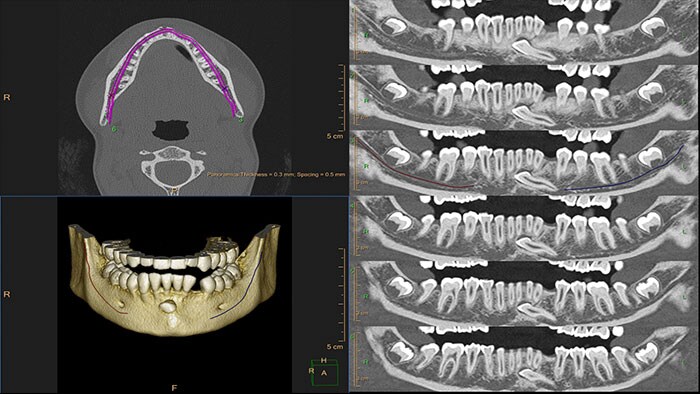
Benefits
- The panoramic, cross sectional and volumetric images provides the oral surgeon with information on position of teeth and roots, existing implants, the mandibular canal and the density of the bone; The thickness of the bone, depth of the jaws and other pathologies can also be evaluated and measured.
- Dual Energy Viewer
-
CT Dual Energy Viewer
Visualize data from dual-energy acquisition
CT Dual Energy Viewer provides a set of tools for registration, quantification, and visualization of dual-energy image data acquired from the Philips iCT scanner’s sequential dual-energy acquisition.
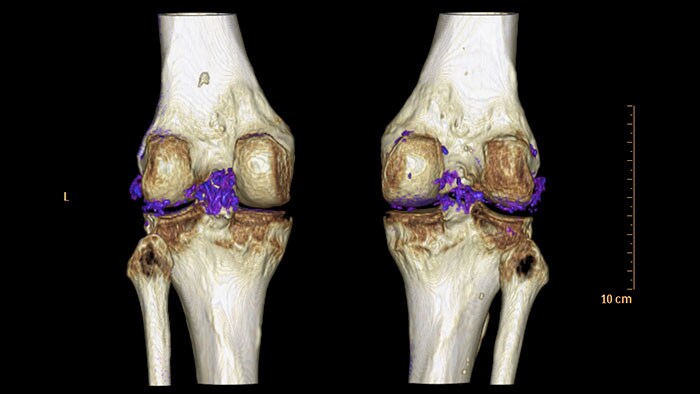
Benefits
- This application assists in separation and analysis of materials such as calcium, iodine, and uric acid.
- Viewer (MMV)
-
Multi Modality Viewer (MMV)
Initial viewing platform for advanced analysis needs
Supports study review, side-by-side comparison, series arrangement as well as 2D and 3D manipulation of MR, CT, PET, NM, US, DX, CR, RF and XA images.
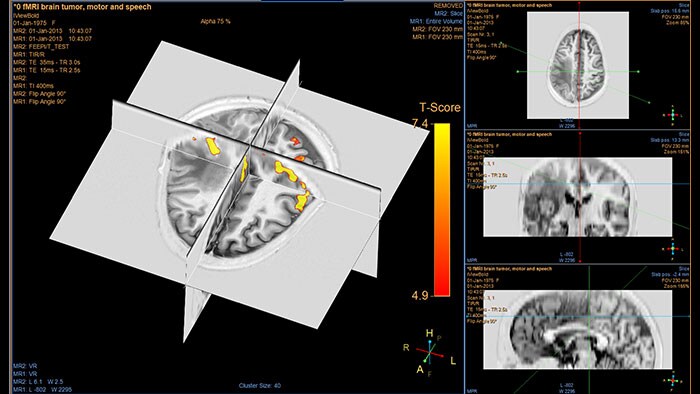
Benefits
- Supports multiple image rendering modes and geometries as well as fusion capabilities of two series including registration options.
- Offers a set of tools for basic measurements, stitching multi-station data and generation of new DICOM series/objects for communication purposes.
- Supports the generation of MR DICOM series in the form of a dedicated MPR series derived from the 3D T1 acquisition, fused with objects like fiber, SPM (fMRI) and/or segmented structure.
- A unique patient-centric workflow facilitates communication between the IntelliSpace Portal and Philips Image Guided-Therapy systems, to automatically launch relevant advanced analysis data before intervention*.
* This requires specific plug-in installation on the ISP client which integrates with the Philips Cath-lab systems.
- Zero Foot Print Viewer
-
Zero Footprint Viewer*
Access to advanced DICOM viewing anywhere
Provides a clinically rich viewing environment, such as quick prior comparison with automatic registration, MPR and Volume modes and Key images workflow. The HTML based viewer allows access anywhere to imaging data stored and created on IntelliSpace Portal outside and inside the hospital.

Benefits
- Built in Peer2Peer. Real-time collaboration capabilities supports communication and consultation between physicians.
* The viewer is not intended for diagnostics image review. Viewer is supported on OS X 10.10 and Windows 7,10 using: Internet Explorer, Chrome, Edge, Safari. Functionality is not available in IX workstation configuration.
- Liver Health
-
MR Liver Health
Dedicated workflow with automated calculation of whole liver volume
Offers a dedicated workflow to support the assessment of liver diseases from MRI biomarkers such as Fat Fraction (FF) or T2*/R2*. It provides automatic segmentation of the whole liver on T1 weighted images as well as 3D visualization and parametric quantification of liver segments and user-defined regions of interest.
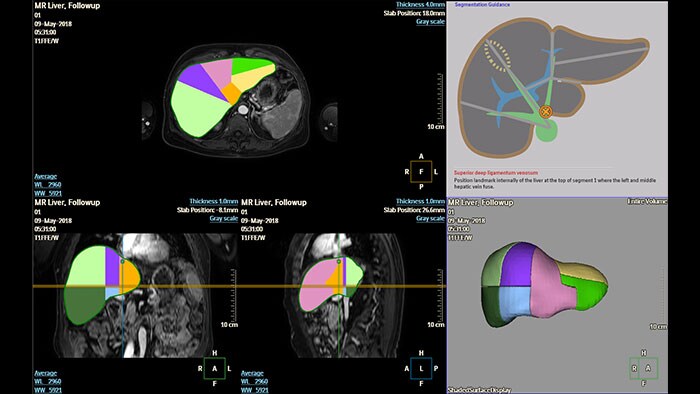
Benefits
- Longitudinal assessment is available to compare MR parametric maps at different time points.
- Thresholding on T2* and/or FF maps for quantification of liver tissue from the segmented whole liver.
- Numerical and graphical results.
- Results for the whole liver, liver segments and user-defined ROI’s.
- JETPack Application Suite
-
NM JETPack Application Suite
Generate new clinical insights
NM JETPack Application Suite for general MI includes a complementary set of organ-specific applications to meet the current and evolving needs of MI users, including endocrine, gastric, hepatobiliary, lung, neuro, renal, and whole-body and bone applications.
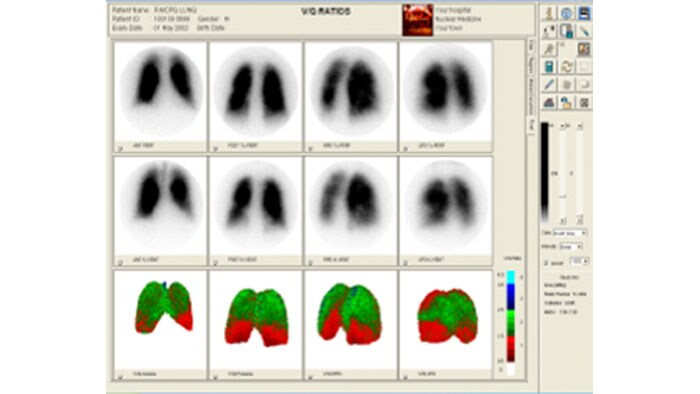
Benefits
- Allows calculation of regional cerebral blood flow, brain perfusion index, dopamine transport, liver perfusion, micturition, and gastro-esophageal reflux.
- An optional IDL developers’ kit is available for development of applications.
- Processing Application Suite
-
NM Processing Application Suite
Streamline Molecular Imaging workflow
Offers comprehensive analysis and processing protocols for planar and SPECT studies including renal, lung, whole-body and bone, cardiac (first pass, shunt, and MUGA), gastric, esophageal, hepatobiliary, and endocrine applications.
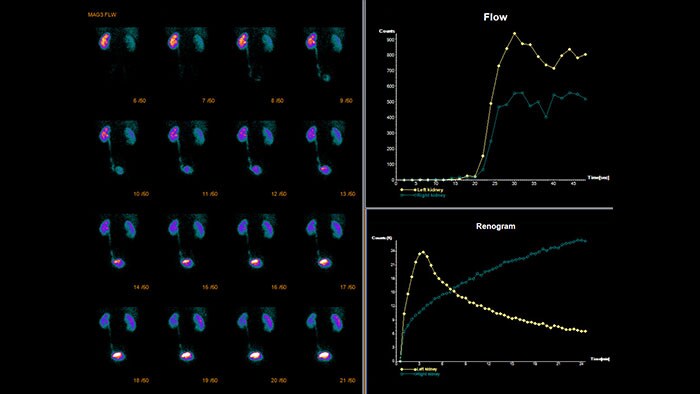
Benefits
- Features Philips AutoSPECT Pro software for automated SPECT reconstruction and re-orientation.
- A set of tools to perform daily and periodic quality assurance for SPECT Cameras with motion correction, as well as CT-based attenuation and scatter correction.
- Vascular Processing - DSA (in MMV)
-
XA Vascular Processing - DSA (in MMV)
Contrast arterial structures with surrounding bone and soft tissue to assist in identification of vascular abnormalities
The XA Vascular Processing – DSA (in MMV) expands your workflow by allowing you to read and post-process iXR images virtually anywhere. Obtain images of arteries in various parts of the body using tools to perform standard and run subtractions, pixel shifting, and landmarking. This application also provides post-processing tools to edit and optimize the DSA XA data created in the interventional room.
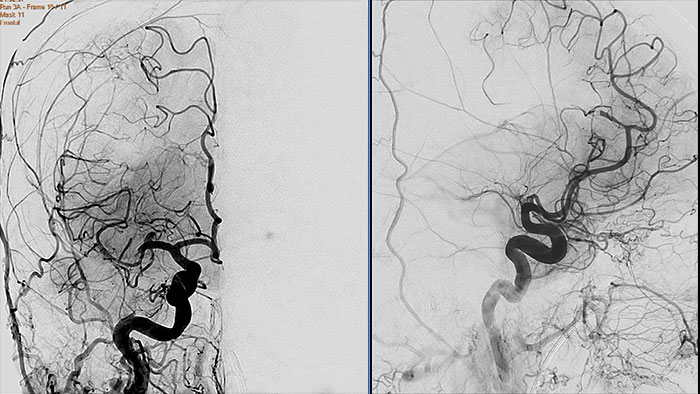
Benefits
- Single image and ‘Run’ subtraction.
- Pixel Shifting to correct for patient movement during contrast injection and can be performed manually.
- Landmarking helps set a partial subtraction factor.
- Partial subtracted image shows (to a certain degree) the complete image, with the contrast enhanced depending on the subtraction factor.
- Same workflow as in the Philips Allura system.
